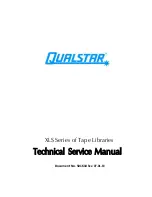
162
4. Click "Apply" to save the settings. Upon successful configuration, the NAS will be
able to connect to the LDAP server.
5. Configure LDAP authentication options.
o
If Microsoft Networking has been enabled (Network Services > Win/Mac/NFS >
Microsoft Networking) when applying the LDAP settings, specify the users who
can access the NAS via Microsoft Networking (Samba.)
Local users only: Only local NAS users can access the NAS via Microsoft
Networking.
LDAP users only: Only LDAP users can access the NAS via Microsoft
Networking.
o
If Microsoft Networking is enabled after the NAS has already been connected to
the LDAP server, select the authentication type for Microsoft Networking.
Standalone Server: Only local NAS users can access the NAS via Microsoft
Networking.
LDAP Domain Authentication: Only LDAP users can access the NAS via
Microsoft Networking.
6. When the NAS is connected to an LDAP server, the administrator can:
o
Go to "Privilege Settings" > "Users" and select "Domain Users" from the drop-
down menu. The LDAP users list will be shown.
o
Go to "Privilege Settings" > "User Groups" and select "Domain Groups" from the
drop-down menu. The LDAP groups will be shown.
o
Specify the folder permissions of LDAP domain users or groups in "Privilege
Settings" > "Shared Folders" > click the "Access Permissions" button next to the
folder to be configured.
Note :
Both LDAP users and local NAS users can access the NAS via File Station,
FTP, and AFP.
LDAP Authe ntic a tion Te c hnic a l Re quire m e nts with M ic ros oft Ne tworking
Required items to authenticate the LDAP users on Microsoft Networking (Samba):
1. A third-party software to synchronize the password between LDAP and Samba in
the LDAP server.
2. Importing the Samba schema to the LDAP directory.
A. Third- pa rty s oftwa re
















































